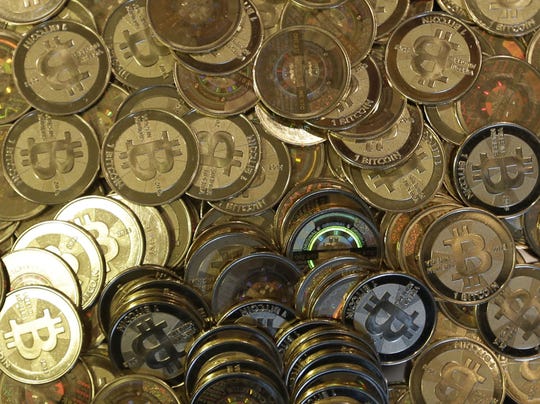Bitcoin tumbles after China crackdown
Alistair Barr,
and Kim Hjelmgaard, USATODAY 6:37 p.m. EST December 18,
2013
Bitcoin is supposed to be beyond the reach of governments, but some central banks and financial regulators are cracking down on the virtual currency, or questioning its status. Story Highlights
SHARE
146
CONNECT
74 TWEET
13
COMMENTEMAILMORE
Bitcoin was supposed to be beyond the reach of governments, but investors
in the virtual currency are realizing that is not the case.The price of a Bitcoin slumped Wednesday after China's largest exchange for the virtual currency said it would stop accepting deposits in yuan — China's local currency. The much-ballyhooed Bitcoin currency has lost more than half its value since hitting records above $1,100 at the end of November. On Wednesday, the price of a Bitcoin fell 18% to $558 and traded as low as $422.50 earlier in the day, according to an index run by CoinDesk, a website focused on digital currencies. The exchange, BTC China, had to "temporarily stop its yuan account recharging functions," according to comments it made on Weibo, a popular Chinese micro-blogging service similar to Twitter. "Bitcoin is inherently volatile, but the decision by this large exchange has played a role," said Tyler Moore, a Southern Methodist University assistant professor in computer science who has studied Bitcoin. "Stopping new deposits prevents new Chinese investors from piling more yuan into Bitcoin, eliminating some of the demand." Bitcoin is a digital currency and payment method that is not regulated by any government. Instead, software controls how many Bitcoins are produced, leaving it less prone to the whims of central banks, some of which have caused inflation in the past by printing too much paper currency. The Bitcoin software first emerged in 2009 via a person or group using the name Satoshi Nakamoto. Since then, many other developers have jumped on board to support the currency and make it more accessible to consumers and investors. BITCOIN: The basics Increased utility and the potential for Bitcoin to become a new inflation-proof store of value for investors sent the price surging from less than $15 earlier this year to well above $1,000. It has been falling since the People's Bank of China, the nation's central bank, said earlier this month that it would not allow financial institutions to sell, trade or store Bitcoins, which it does not consider to be a real currency because it doesn't have any legal status or monetary equivalent. On Monday, the bank told third-party payment processing firms to stop working with Bitcoin exchanges, according to CoinDesk. That has coincided with BTC China's problems maintaining relationships with payment firms like YeePay and Tenpay. Other financial regulators have also cracked down on Bitcoin or questioned its status. Denmark's Financial Supervisory Authority said this week that Bitcoin and other virtual currencies do not qualify as real money guaranteed by a central bank. Norway also said Bitcoin was not real money this week. "The currency that is supposedly beyond state control is actually still within the grip of governments who want to assess the risks of this new technology," Moore said. The U.S. has so far taken a hands-off approach to Bitcoin, with the exception of anti-money-laundering enforcement. But other countries are taking a tougher line, partly because there are few consumer protections built into the technology, according to Moore. Individual investors typically buy Bitcoin through online exchanges, which store the currency in an account on their behalf. "If that exchange disappears or shuts down, there may be no recourse for getting your deposits back," Moore said. "There's no organization like the FDIC to insure deposits." |
Thursday, December 19, 2013
Bitcoin tumbles after China crackdown
Subscribe to:
Post Comments (Atom)



No comments:
Post a Comment